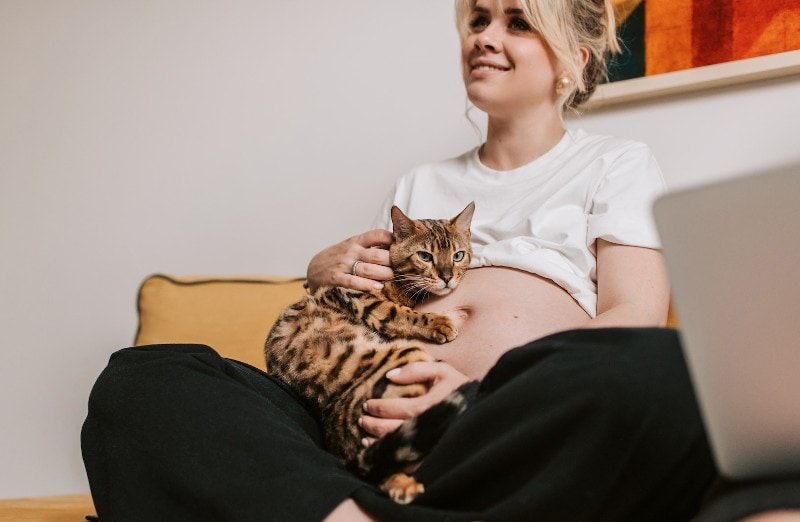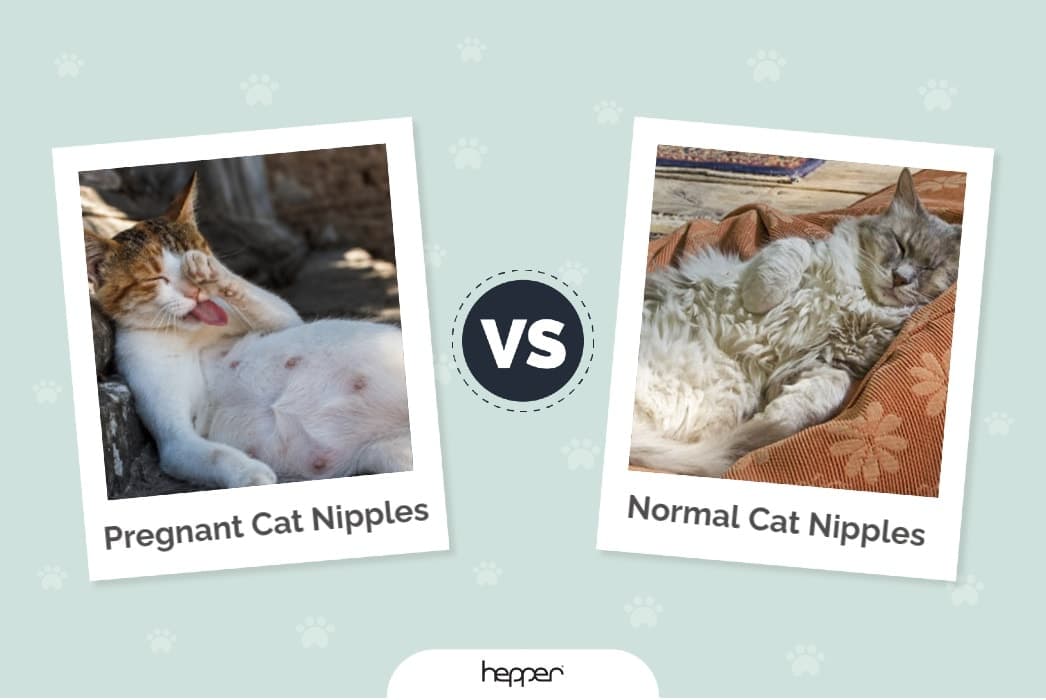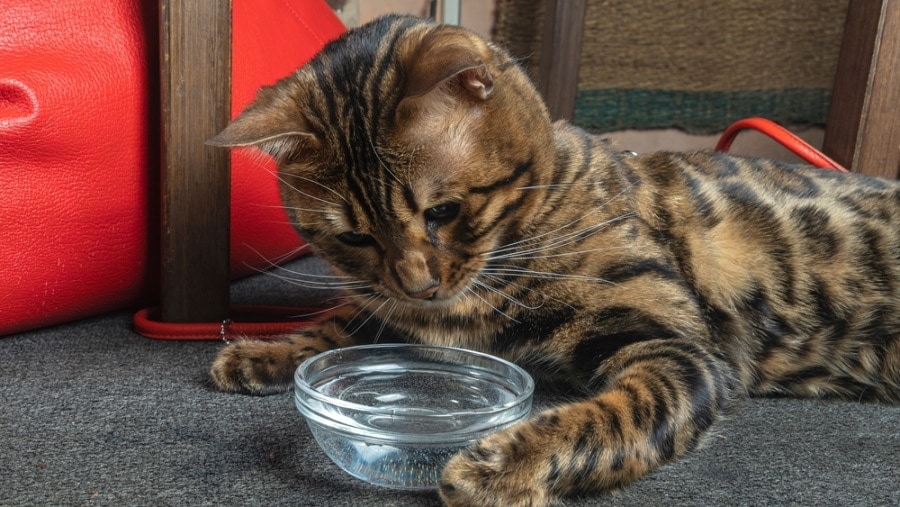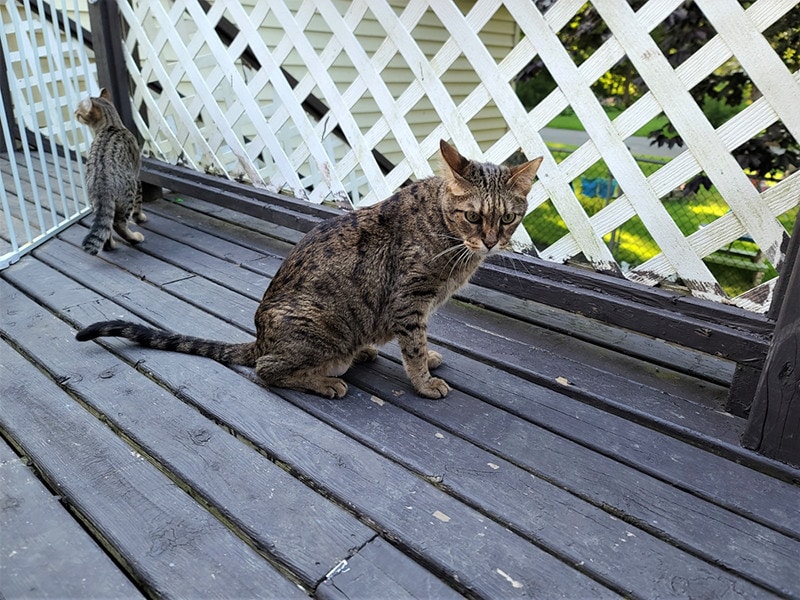Do Cats Know When a Baby Is Coming? Feline Senses & Care Tips

Updated on

Click to Skip Ahead
Anyone who’s spent time with a cat knows that they’re always watching. Cats pay attention to everything going on around them, and they pick up on subtle changes in their environment. If you’re expecting a baby, it’s possible your cat knew—even before you did.
People have been sharing anecdotes about their cats showing them more attention when they’re pregnant. It turns out there’s some science backing it up.
Cats Sense Hormonal Changes
Pregnancy brings a lot of hormonal changes. They occur early in the pregnancy and continue throughout the entire term.
- Human chorionic gonadotropin (hCG) is a hormone that’s produced in the placenta. hCG is used to confirm pregnancy and hits high levels in the early stages.
- Prolactin and relaxin are two hormones that produce breast milk and affect the uterine muscles and pelvic joints.
- Progesterone is a hormone that primes the uterus before pregnancy and helps to maintain a healthy pregnancy.
- Estrogen is a hormone that regulates the rest of the pregnancy hormones, regulates blood flow, and helps the baby develop.
While these hormones have no perceptible odor, it’s possible that they have a similar subtle odor that we can sense, even without realizing it. Cats, with their keen ability to smell, may be able to as well.
This isn’t an exact science, however. It assumes that hormones have an odor we can’t detect and that cats can sense them.

Cats Notice Behavioral Changes
A lot more changes during pregnancy than just hormones. Moodiness, fatigue, sickness, and irritability are common, and these emotional changes lead to behavioral changes. Animals are sensitive to our nonverbal communication and moods, so it’s possible that cats are just sensing those changes.
- Rising hCG levels can cause nausea, which may disrupt your routine and your cat’s feeding time.
- Progesterone can cause excessive fatigue, so you may spend more time napping and less time puttering around the house.
- Planning for the baby takes time. If you’re focusing on the nursery and pregnancy books and choosing a name, that’s likely less time you’re spending playing with your cat or cuddling.
- Both blood volume and circulation increase during pregnancy, causing a rise in body temperature. Cats often seek out warm, cozy spots, so your cat probably noticed this change in your body.
- It’s well known that pregnant women shouldn’t clean the litter box. If you’ve been the one tasked with this job in the past, but now someone else is doing it, that’s a big change for your cat.
Cats May Feel the Fetal Heartbeat
Cats have exceptional senses, including hearing. While we don’t know if cats can hear a baby’s heartbeat before it can be detected through a Doppler ultrasound device or other methods, cats do have an extra ear fold that can detect high-frequency sounds.
Again, this isn’t an exact science, but it’s theoretically possible that your cat can hear that heartbeat when they lie near your belly. Eventually, people can hear it, too, so it’s probably just a little earlier with that acute hearing.

How Do Cats Handle Pregnancy?
A new baby is a major life change. Cats are creatures of habit, so how they handle a new baby can differ. Some cats may become more protective if you’re tired or ill, while otherwise independent cats may become clingier and follow you around the house.
Some cats aren’t tolerant of major changes in the household and act out. If your cat begins soiling outside the litter box, scratching walls or furniture, hiding, going off food, or other surprising behaviors, it’s a sign that they’re rebelling against the change in their routine.
Ultimately, your cat probably doesn’t “know” that you’re pregnant. It’s more like they understand something is different but don’t know what. It’s best to take this time to prepare your cat for what’s coming.
- Introduce your cat to baby items, such as a crib and infant seat. This is especially important if you rearrange your cat’s favorite places to accommodate a baby.
- Start playing sounds of babies crying or cooing. Go slow because these sounds can stress your cat out, but it’s better to get your cat comfortable with them before dealing with an actual baby and late-night feedings and changing.
- Start cat-proofing your baby areas and baby furniture. Use sticky tape or barriers to discourage your cat from entering the nursery or jumping into the crib or onto the changing table.
- Plan how to introduce your cat to the baby once they’re born. You may want to start small with a blanket or clothing from the hospital. Supervise interactions and never leave your cat alone with the baby.
Conclusion
Does your cat know you’re pregnant? Maybe, but not exactly. While we don’t know exactly what cats sense, there’s no doubt that they’re sensitive and perceptive. Cats probably don’t understand what pregnancy is or what it means, but they’re too observant to miss that something is different about their environment and routine.
Featured Image Credit: Konstantin Aksenov, Shutterstock










